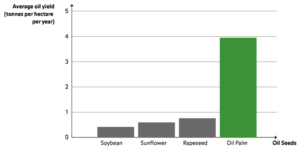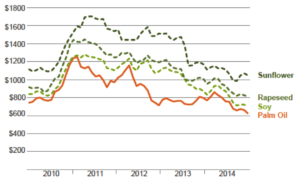To boycott or not to boycott Nutella

“We should stop eating Nutella, for example, because it’s made with palm oil.” – French Minister of Ecology, Ségolène Royal. Is Minister Royal’s call to boycott Nutella fair?
“We should stop eating Nutella, for example, because it’s made with palm oil. Oil palms have replaced trees, and therefore caused considerable damage to the environment.” – French Minister of Ecology, Ségolène Royal [1]
Why the controversy?
One of the key ingredients in Nutella is palm oil, a controversial commodity mainly produced in Malaysia and Indonesia that is celebrated for its crop efficiency and low cost of production but also criticized for its contribution to deforestation and pollution.
Exhibit 1: Palm oil is the most efficient oilseed [2]
Exhibit 2: Palm oil is also the lowest cost [3]
However, due to the potential for lucrative gains in this industry, deforestation through cheap slash-and-burn techniques has resulted in catastrophic environmental degradation.
Exhibit 3: Pollution in Indonesia due to deforestation
The resulting air pollution has plagued Southeast Asia, especially during the El Niño period when the effect of man-made deforestation is combined with exceedingly hot temperatures. Negative press coverage has surrounded the causes of the severe air pollution. Because of this, governments have started to clamp down on companies (especially in palm oil) that contribute to unsustainable deforestation and pollution by banning cultivation of carbon-rich peatlands and imposing penalties on companies and farmers that use the slash-and-burn technique [4].
Additionally, palm oil is impacted by changes in the climate, such as high rainfall variability [5]. The resulting crops are lower in quality and yield less quantity. It has also become more difficult to extract the fruit bunches due to flooding and weatherworn road conditions.
Threats to Nutella
These challenges in the palm oil industry threaten to disrupt a steady and cheap supply of raw materials for many consumer product companies that rely on palm oil, including Nutella.
With increasing public awareness of palm oil and its role on environmental sustainability, Nutella will need to pay attention to its supply chain to avoid negative publicity and potential consumer backlash. Additionally, regulation in the palm oil industry and climate change threaten to limit the supply of palm oil, which will likely result in higher palm oil prices if palm oil producers are not sufficiently equipped to operate sustainably. This would remove the competitive advantage of palm oil and significantly increase raw material costs for Nutella.
Nutella’s course of action
In order to overcome these challenges, Nutella has achieved 100% sustainable palm oil certification by the Roundtable on Sustainable Palm Oil (RSPO) [6] [7]. Nutella has elected to comply with the most stringent level: sustainable and segregated certification. This means that the palm oil sourced by Nutella is traceable back to the source and is economically, ecologically and socially sustainable in accordance with RSPO principles and criteria [8]. Through its best-in-class practices, Nutella has become one of the leading voices in the RSPO panel, with influence over policy development in the arena of sustainable palm oil.
To advance palm oil sourcing sustainability beyond the framework of RSPO, Nutella’s parent company (Ferrero) has also put in place the Ferrero Palm Oil Charter [9], which breaks down in greater detail the areas Ferrero aims to address to drive sustainability in its palm oil supply chain. In order to implement their commitment, they have partnered up with an NGO, The Forest Trust (TFT), to monitor their suppliers and hold themselves accountable to the Charter.
What more can Nutella do?
To bring about further improvement in ensuring a sustainable supply chain, Nutella should adopt breakthrough technology that will help remotely spot deforestation in its palm oil supply chain in real-time. One such program is Global Forest Watch’s PALM (Prioritizing Areas, Landscapes and Mills) Risk Tool [10]. Using this tool will provide a check against RSPO and TFT’s standards and remove doubt from critics of RSPO who claim that RSPO certification is unreliable and unverified by independent parties [11].
Exhibit 4: PALM Risk Tool assessing a high-risk area (left-hand screen) vs. low-risk area (right-hand screen)
Understanding that creating a sustainable supply chain will result in more costs being borne by the producer of palm oil, Nutella will need to share the cost of “going green” with producers by paying a slight premium for sustainable palm oil [12]. This would jumpstart interest for RSPO certification from palm oil producers, increasing the supply of sustainable palm oil for Nutella to source from and long-term sustainability of a highly valuable crop.
If Nutella were truly committed in the cause of sustainable palm oil production beyond its own supply chain, it would also dedicate resources to support NGO projects that will help more plantations comply with RSPO, in the same way that IKEA has provided resources to WWF to increase FSC-certified forest areas. This would increase the supply of sustainable palm oil, not just for Nutella but also for the world, while generating positive brand equity for Nutella.
(793 words).
References
[1] The Guardian, “Stop eating Nutella and save the forests, urges French ecology minister” (Jun. 16 2015), https://www.theguardian.com/environment/2015/jun/17/stop-eating-nutella-and-save-the-forests-urges-french-ecology-minister
[2] Sime Darby, Palm Oil Facts and Figures (2013), http://www.simedarby.com/upload/Palm_Oil_Facts_and_Figures.pdf
[3] Conservation International & World Wildlife Fund, Sustainable Sourcing Guide for Palm Oil Users: A practical handbook for US consumer goods and retail companies (May 2015), http://www.conservation.org/publications/Documents/CI_Palm-Oil-Sourcing-Guide.pdf
[4] The Star Malaysia, “Fewer hot spots in Indonesia as authorities clamp down on Sumatra forest fires” (Jul. 9, 2016), http://www.thestar.com.my/news/regional/2016/07/09/fewer-hot-spots-in-indonesia-as-authorities-clamp-down-on-sumatra-forest-fires/
[5] Indonesian Oil Palm Research Institute, Climate Change on Oil Palm: Its Impact and Adaptation Strategies, https://www.researchgate.net/publication/265201096_CLIMATE_CHANGE_ON_OIL_PALM_IT’S_IMPACTS_AND_ADAPTATION_STRATEGIES
[6] Ferrero, Corporate Social Responsibility Report (2014), https://www.static.ferrero.com/globalcms/documenti/2163.pdf
[7] Ferrero, “Only sustainable traceable certified palm oil for Ferrero” (Feb. 3, 2015), https://www.ferrero.com/group-news/ONLY-SUSTAINABLE-TRACEABLE-CERTIFIED-PALM-OIL-FOR-FERRERO
[8] Roundtable on Sustainable Palm Oil, Principles and Criteria for the Production of Sustainable Palm Oil (2013), http://www.rspo.org/publications/download/4b4296c7bb85cb3
[9] Ferrero, “Ferrero Palm Oil Charter” (Nov. 11, 2013), https://www.ferrero.com/group-news/Ferrero-Palm-Oil-Charter
[10] World Resources Institute, “Companies can now spot deforestation in their palm oil supply chains before it happens” (Jun. 8, 2016), http://www.wri.org/blog/2016/06/companies-can-now-spot-deforestation-their-palm-oil-supply-chains-it-happens
[11] EurActiv, “France adopts watered-down palm oil tax” (Mar. 21, 2016), https://www.euractiv.com/section/agriculture-food/news/france-adopts-watered-down-palm-oil-tax/
[12] Eco-Business, “Indonesia to Europe: Pay for sustainable palm oil” (Mar. 22, 2016), http://www.eco-business.com/news/indonesia-to-europe-pay-for-sustainable-palm-oil/
Image sources
Cover image: https://hipsterveggie.wordpress.com/2016/01/24/boycott-nutella/
Exhibit 3: http://www.cnn.com/2015/01/27/asia/asia-air-pollution-haze/








Do you think it is fair for the French Minister of Ecology to push for a boycott given the fact that Nutella is making clear efforts to promote improved production of palm oil? It is interesting that the French Parliament recently voted down a tax on palm oil products, despite many other vegetable oils facing a tax in France. It appears that the palm oil lobbyist of Malaysia and Indonesia have a strong influence in French politics!
http://www.reuters.com/article/us-france-palmoil-idUSKCN0Z90Z7
Interesting! It’s amazing that our Section’s Malaysian and Indonesian have jumped to the defense of palm oil. I completely agree with you that consumers of palm oil must be willing to absorb some of the costs associated with creating a sustainable supply chain. There’s a real difference among the sustainable practices of players in the industry and yet they all work for the same price. How would you feel if either Malaysia and Indonesia (as Palm Oil suppliers) or importer countries were to set export or import bans on palm oil that is not RSPO+ certified? This would certainly shrink supply, but at the detriment of current smallholders? Is that too much short term pain?
What a great article, thank you for bringing it to our attention! Given the many health risks associated with palm oil for it being highly saturated, do you think Nutella should be innovating its recipe altogether, replacing its oil component with an unsaturated alternative? Better for the environment and healthier!
I am glad to hear that the parent company of Nutella, Ferrero, has taken a stand in support of using responsibly sourced palm oil in its Nutella products. As you indicated, there are still a number of measures that Ferrero can take to ensure the integrity of its palm oil supply chain. While there are certainly ways to reduce/stop deforestation associated with palm oil production, Ferrero could also consider replacing its use of palm oil with another ingredient with similar properties. As outlined int his article (https://www.theguardian.com/sustainable-business/2015/feb/17/scientists-reveal-revolutionary-palm-oil-alternative-yeast), scientists at the University of Bath have discovered yeast ingredient that matches palm oil’s key properties almost exactly. While this alternative ingredient would likely be more expensive than palm oil, and is far from ready to be brought to market, it would provide Ferrero with a truly sustainable solution that would enable consumers to enjoy Nutella for years to come!
Hi Jolynn,
Thank you for sharing such a thoughtful article on Nutella and palm oil. Your idea of using technology to track the risk of supply looks promising. However, I am worried that in the wrong hands, such a tool may help to silence critics while working against certified palm oil producers. A profit seeking executive at Nutella could use it forecast available supply and put price pressure on suppliers in case they see enough certified supply in the near term.
The difference between IKEA and Nutella is that IKEA is the face of the industry, whereas palm oil is used in fast food, packaged food, personal care products etc. There are many players that would have to cooperate to make the game fair. Without such a cooperation, any investment outside Nutella’s own supply chain is a drop in the bucket without benefits.
Thankfully, there are some organizations rallying for sustainable palm oil on behalf of all companies. Here is one that keeps a scorecard on the commitment of each brand:
http://www.ucsusa.org/global-warming/stop-deforestation/palm-oil-scorecard-2015
Interesting article highlighting the future role producers and consumers will play in creating more sustainable supply chains. While I agree that Nutella/Ferrero’s move to invest in sustainable palm oil is ultimately good for its brand and for the consumers of the product, I wonder how big of an impact this will have on the overall market for palm oils overall given the fact that it is likely not one of the leading palm oil consumers in the world. While any company bringing awareness to this cause could be viewed as a positive, it would have much more of an impact if a more prominent, palm-oil intensive company announced a similar dedication to investing in sustainable supply chain practices. Therefore, I believe Nutella should use its significant brand power to influence and drive awareness around this cause, increasing consumer awareness that could drive some of the other major palm oil consumers to adopt more sustainable practices.
Yay, Nutella! I understand the cost reasons that so many food producers have switched to palm oil, but I think this has been detrimental to Nutella on the whole, beyond just the environmental concerns. Up until 2005 or 2006, the US mix of Nutella did not even use palm oil. And the flavor (specifically, the hazelnuttiness) of the spread has definitely changed. Even though Ferrero has come far in terms of incorporating sustainable palm oil practices into its production, I still have trouble with the inclusion of palm oil in the ingredients mix. And to echo Farhaneh’s comment, palm oil is actually quite unhealthy.
(Plus deforestation is doubly bad, because in addition to air pollution, it is also killing the orangutans.)
[https://gettingonmysoapbox.wordpress.com/2016/06/20/nutella-does-not-get-it-but-france-does/]
A theme of these TOM challenge posts is that my favorite foods are killing the earth. I very much enjoyed your take in this article, and it’s promising that progress is being made to curb the impact of palm oil. I wonder, however, if we are putting too much of the responsibility on Ferrero to mitigate the costs (by being charged a premium) or by contributing to NGOs to facilitate the certification process of suppliers when–as Ludwig’s comment points out–that palm oil is used in such a vast array of products. How do we engage the producers of these other products to follow suit? I would be interested to learn more about the regulatory changes that you briefly alluded to–are any changes on the horizon in this regard?